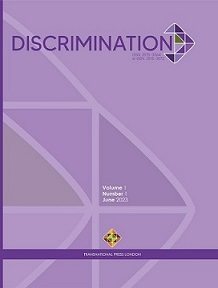About the Journal
 Focus and Scope of Discrimination
Focus and Scope of Discrimination
Discrimination, formerly known as Journal of Gypsy Studies, is an international, interdisciplinary and peer-reviewed Open Access journal dedicated to publishing high quality research and scholarship in social sciences with a focus on discrimination. Discrimination invites articles on discrimination from all social science disciplines including anthropology, demography, economics, health and wellbeing, history, legal studies, psychology, political science, social work, and sociology. Articles may focus on one or more aspects and domains of discrimination including gender, ethnicity, culture, economy and labour markets and any cognate areas. A variety of formats are available including research articles, debates, conversations/interviews, book reviews, opinion and viewpoints and letters.
Discrimination offers a universally accessible venue where sound scholarship and research, as well as reviews and debates, are disseminated. The journal establishes a genuine forum for serious discussion and exchange among the researchers in the field, reaching out to a broad audience of students, professionals, policy makers and enthusiasts alike. Discrimination aims to maintain a fair balance between theoretical analyses and empirical studies. Critical and novel approaches and methods are particularly welcome.
Discrimination aims to be a quality venue for scholarly exchange and therefore follows a strict editorial review policy with double blind reviewing and adhering to ethical publishing principles to ensure the Journal is included in indexes such as SSCI, SCOPUS, EBSCO and others.
Discrimination is indexed and abstracted in:
- RePEc
- Central and Eastern European Online Library (CEEOL)
- Sherpa RoMEO
- American Sociological Association’s Publication Options Journal Directory.
Peer Review Process
Discrimination follows a double blind peer review policy. Articles submitted to the journal are screened by the editorial team and then, if appropriate, sent to two reviewers. Finally, in the light of reviewer comments, the editorial team reaches a decision about publication. This decision is final.
Research Articles, Letters, Brief Communications, Case Studies, Reports, Analysis, Reviews, and Viewpoints are peer-reviewed. All forms of published correction may also be peer-reviewed at the discretion of the editors. Other contributions are not usually peer-reviewed.
All submitted manuscripts are read by our editorial staff. Only those papers that seem most likely to meet our editorial criteria are sent to reviewers. Those papers judged by the editors to be of insufficient general interest or otherwise inappropriate are desk rejected without external review. Manuscripts judged to be of potential interest to our readership are sent to two or more reviewers. The editors then make a decision based on the reviewers' advice.
Reviewers are welcome to recommend a particular course of action, but they should bear in mind that the other reviewers of a particular paper may have different technical expertise and/or views, and the editors may have to make a decision based on conflicting advice. The most useful reports, therefore, provide the editors with the information on which a decision should be based. Setting out the arguments for and against publication is often more helpful to the editors than a direct recommendation one way or the other.
Our editors evaluate the strength of the arguments raised by reviewers and by the authors, and may also consider other information not available to either party. Our primary responsibilities are to our readers and to the scientific community at large, and in deciding how best to serve them, we must weigh the claims of each paper against the many others also under consideration. Reviewers' criticisms are taken seriously, particularly the technical criticisms.
Discrimination follows the rules of publication ethics to ensure academic objectivity and rigour of the journal.
Publication Frequency
Discrimination is published once a year in December.
Code of Conduct and Publishing Ethics
Transnational Press London is committed to maintaining the highest publication ethics standards. We, therefore, ask that all contributors and reviewers adhere to publishing ethics. Further guidance can be found through the COPE Core Practices and on the COPE website. Review the Full Publication Ethics Statement.Open Access Policy
Discrimination is an open-access publication, allowing users to freely access, download, copy, distribute, print, search, or link to full-text articles for any lawful purpose without requiring permission from the publisher or author.
Open Access Article Processing Fee for Discriminationis £0.
Open Access Fees are waived for Discrimination.
CC BY NC ND
The works published in this journal are licensed under a Creative Commons Attribution-NonCommercial-NoDerivatives 4.0 International License.
Authors of articles published in this journal retain the copyright and full publishing rights without restrictions.
This journal allows all versions to be deposited in an institutional or other repository of the author’s choice without embargo.
This journal is included in PKP Preservation Network archives:
https://journals.tplondon.com/disc/gateway/lockss
https://journals.tplondon.com/disc/gateway/clockss
Journal History
Discrimination, formerly known as Journal of Gypsy Studies, was founded in 2015 by a group of academics led by Dr Başak Akgül, Prof Ibrahim Sirkeci, Dr Ozge Burcu Gunes, Dr Danielle van Dobben Schoon, and Dr Deniz Eroglu Utku. Almudena Macias León (University of Malaga, Spain) joined as the chief editor in 2022.
Copyright © 2012-2024 Discrimination / Transnational Press London | All rights reserved




